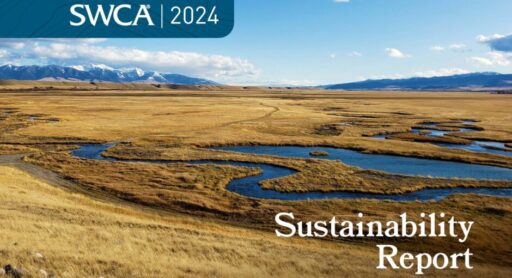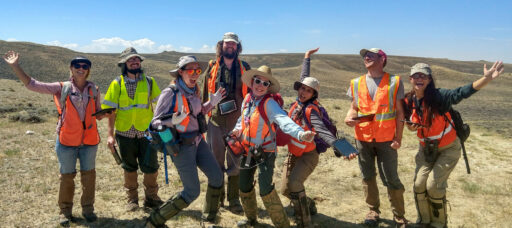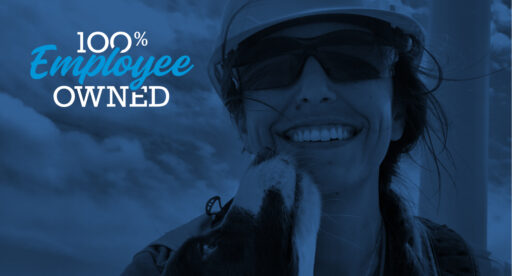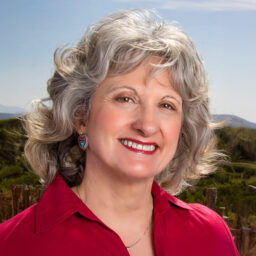2025
Comparably’s Best Company Outlook
* Providing engineering services in these locations through SWCA Environmental Consulting & Engineering, Inc., an affiliate of SWCA.

From the experts we hire, to the clients we partner with, our greatest opportunity for success lies in our ability to bring the best team together for every project.
That’s why:

At SWCA, sustainability means balancing humanity’s social, economic, and environmental needs to provide a healthy planet for future generations.

SWCA employs smart, talented, problem-solvers dedicated to our purpose of preserving natural and cultural resources for tomorrow while enabling projects that benefit people today.

At SWCA, you’re not just an employee. You’re an owner. Everyone you work with has a stake in your success, so your hard work pays off – for the clients, for the company, and for your retirement goals.
Meet Carolyn Stewart - SWCA Principal Tribal Liaison
 Carolyn is an energy industry veteran with 45 years of renewable energy and consulting experience. Over the last 20 years, she has worked for and with hundreds of Native American communities on energy development and cultural resource preservation. In this role, Carolyn is working with clients and Tribal representatives to ensure energy projects are built respectfully and responsibly.
Carolyn is an energy industry veteran with 45 years of renewable energy and consulting experience. Over the last 20 years, she has worked for and with hundreds of Native American communities on energy development and cultural resource preservation. In this role, Carolyn is working with clients and Tribal representatives to ensure energy projects are built respectfully and responsibly.
A: My background is finance, and I worked for a large natural gas utility in the Midwest for close to 20 years before joining an energy consulting firm with offices all over the country. In that role, I moved to the Southwest and had the opportunity to work with numerous Indian Tribes on utility and renewable energy development. After establishing a Tribal energy practice there, a friend and I started a Native- and women-owned consulting business working exclusively with Tribes. That was life-changing for me, and I have worked with and for Tribes exclusively since then.
With an increase in renewable energy development following passage of the American Recovery and Reinvestment Act of 2009, I became aware of several renewable energy developers who were unsure about how to work with Tribes. It seemed like a good match for me, since I had worked in both worlds. So, in 2012 I joined NextEra Energy. There, over a 10-year period, I established a team, which ultimately grew to 7 individuals, focused on developing and maintaining relationships with Tribes whose ancestral lands were in close proximity to proposed NextEra project sites on Federal and private lands.
The goal was not to build projects on Tribal lands, but to be able to work directly with Tribes, on a voluntary basis, to identify potential Tribal issues and concerns early in the development process. This policy of early Tribal outreach made good business sense, since infrastructure changes made to avoid sacred sites in the design phase are much less costly than those made during construction. This industry-precedent setting process worked well, both for NextEra to build projects, and for the Tribes who were able to protect sensitive cultural resources. And in recent years, ESG (Energy, Social, and Governance) investors and lenders have become more interested in early Tribal outreach and avoidance of potential Tribal issues.
A: The roles I enjoyed most were those where I was responsible for establishing a new process or effort – something that had never been done before. Thinking back those were the most meaningful – where I could really make a difference. I am most proud of my work at NextEra. In facilitating direct conversation between Tribes and energy companies early on in the development process, it turned out there was actually a lot the energy companies could do to help Tribes protect sensitive resources, which in turn, helped the companies because they could build their projects. Such a simple solution, but this was not done previously.
A: In my role at SWCA, I have the opportunity to help other energy companies figure out how they want to interact and work with Tribes. Projects on Federal lands require Tribal involvement (government-to-government consultation between the Tribal government and Federal agencies), and that doesn’t always go well. Companies that choose to work with Tribes, especially projects on private land, have the opportunity to learn what those Tribes care about, and act respectfully and responsibly. My skillset lies in effectively navigating these complex situations because I know how to communicate with both groups.
A: In establishing the Tribal Relations function at NextEra, we found it difficult to identify consultants who could support its efforts, since what NextEra was doing was so different than the norm. SWCA was unique in its ability to work with Tribal representatives during cultural surveys, and deal with contracting situations that could be challenging. I had very positive experiences with SWCA teams on multiple projects, including Crowned Ridge, where I met Scott Phillips and many others, so I knew there would be support for providing these types of services for other clients. Knowing I was going to be working with good people mattered to me a lot.
A: I am excited to be part of the new Tribal Relations Services team. We are currently working on creating a set of services to offer clients. My partners on the team all bring very different skillsets, and I truly believe SWCA provides a unique set of offerings that no other consultants can match to help meet our clients’ needs.
SWCA works for a lot of companies in many different sectors, and these Tribal Relations services apply across the board, not just to energy projects. I am continuing to support NextEra and other large renewable energy companies, but our team has credibility and trust with Tribes so that could open doors for new opportunities, like commercial scale projects. Helping more companies be able to do the right thing is exciting to me.